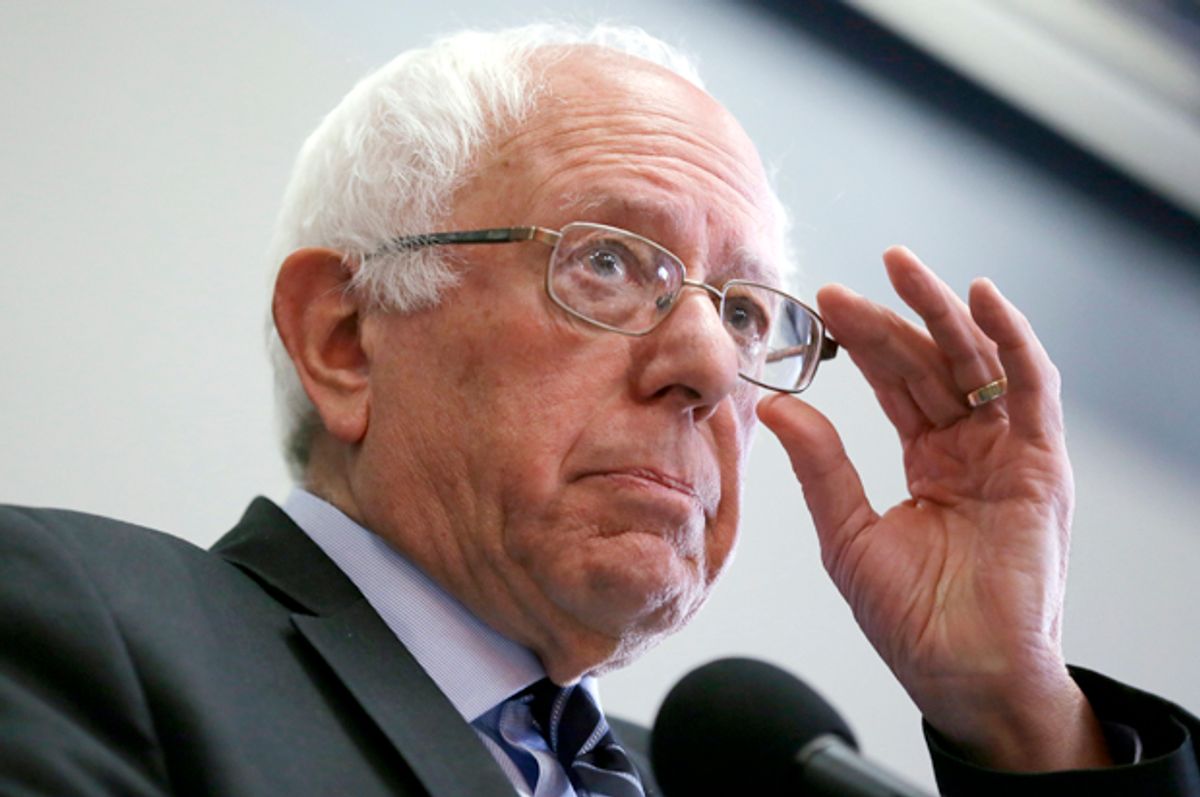"I think the super delegates are going to have make a very difficult decision and that is, if a candidate wins in a state by 40 or 50 points, who are you going to give your vote to?" Democratic presidential candidate Bernie Sanders asked over the weekend after winning three Western states by upwards of 40 to 70 points.
While his rival Hillary Clinton still holds a substantial lead in the undedicated so-called superdelegates, lawmakers and Party loyalists who have up until voting at the Democratic National Convention (DNC) to decide their vote of support, Sanders has been working to persuade superdelegates to vote in line with the voters of their states.
"I think what’s important to remember here is that superdelegates are kind of like football recruits," a Sanders spokesperson said in an interview with CNN's "New Day" on Monday. "You know, they say they are coming but until they have signed on the dotted line and they’re in practice, you don’t know that they’re all the way with you and that they’re on your team. And so we think that we still have time to garner support from these superdelegates, especially when we’re winning."
On Saturday, a most unlikely Sanders supporter appeared to agree with that sentiment, pledging his superdelegate vote in favor of Sanders as his home state of Minnesota had recently done. Rep. Collin Peterson told Forum News Service that his superdelegate vote will reflect the will of voters in his state who voted for Sanders 62 percent to 38 percent for Clinton.
"I'm voting my district," Peterson said. "I'm going to vote for Bernie."
While the founding member of Democrat's Blue Dog Coalition, formed to promote fiscal conservatism, rarely attends the DNC, he said that if his superdelegate vote would make a difference, he would make the trip to Philadelphia to cast a vote for the Democratic Socialist despite their obvious differences on tax policy. "He's got something going," Peterson said of Sanders's support with young voters. "He's tapped into something."
As the Huffington Post notes, Peterson's non-endorsement pledge to Sanders as a superdelegate is noteworthy because the Blue Dog Democrat is anti-abortion, opposed to embryonic stem cell research, against same-sex marriage and supports the death penalty -- all key positions out of line with Sanders' platform.
Still, Peterson might be more likely to attend the other party's national convention in Cleveland instead this year. That is of course, if Secret Service allows open carry to occur as many attendees of the Republican National Convention have called for.
"You've got to be against gun control to play in my band," Peterson told the The Forum Editorial Board, explaining that his band, "The Second Amendment," might play at the Rock and Roll Hall of Fame in Cleveland during the GOP convention.
Besides Peterson, there is more evidence that Sanders' campaign to persuade superdelegates to follow the will of voters in their states appears to be paying off, albeit in less dramatic fashion. After Sanders won the Alaska caucuses by commanding margins over the weekend, Democratic Party vice chairman Larry Murakami officially pledged his superdelegate vote to Sanders.
"I think it's totally appropriate if we're over 80 percent for one of us to step forward and say, 'yeah, I'm voting for Sanders like everyone in my district, like most of the people in my district and most of the people in Alaska,'" Murakami told Politico.
Democratic Party chairman Bert Marley echoed Murakami and the Sanders campaign, telling Politico that, "I felt like super delegates should reflect for lack of a better term the will of the people so when the results were so overwhelming in Idaho it was the natural thing to do," and pledging his vote to Sanders, who won Idhao's caucus. Utah Democratic Party chairman Peter Corroon also pledged his superdelegate vote to Sanders after his state picked the Vermont senator 79.3 percent to Clinton with 20.3 percent.
All superdelegates committing to Sanders in recent days come from caucus states that have overwhelming favored Sanders. This still leaves Sanders, who trails Clinton by more than 400 superdelegates, at a clear disadvantage. As the Cook Political Report has calculated, even if you awarded Sanders all of the superdelegates in the states he has won so far, it would still not be enough to overcome Clinton’s lead among super-delegates, because caucus states tend to have fewer such superdelegates:
According to figures provided by the Democratic National Committee, here are the numbers of super-delegates in the states Sanders has won so far: New Hampshire (8). Colorado (12). Minnesota (16). Oklahoma (4). Vermont (10). Kansas (4). Nebraska (5). Maine (5). Michigan (17). Idaho (4). Utah (4). Alaska (4). Hawaii (10). Washington State (17). Democrats abroad (4).
The total number of super-delegates in all the states Sanders has won thus far is: 124. Clinton currently leads Sanders by 469-29 among super-delegates who have declared support for one candidate or the other, an advantage of 440. Giving Sanders all of those super-dels in states he won would not come close to closing that gap.

Shares